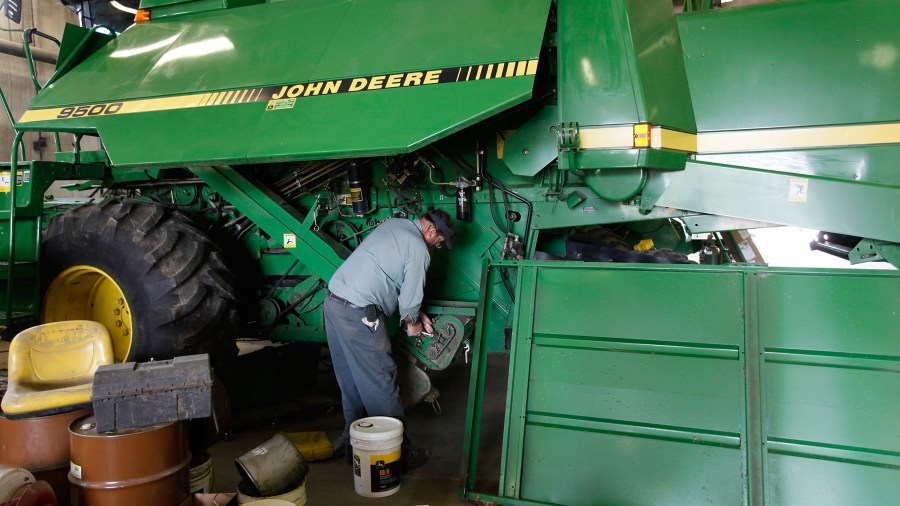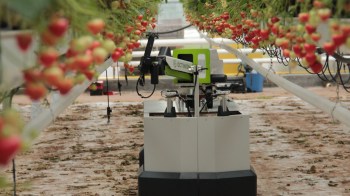The right to repair broken tech is key to farmers

The Federal Trade Commission is turning its attention to the right-to-repair movement — a pushback against manufacturers limiting who can repair the equipment they make. The agency put out a report in May that found “the burden of repair restrictions may fall more heavily on communities of color and lower-income communities.”
The FTC is set to vote Wednesday on next steps. One group watching this debate is farmers. Some companies that make farm equipment only allow repairs at their own dealerships.
Terry Griffin is an agricultural economist with Kansas State University. He grew up on a farm in northeast Arkansas, and back then, DIY equipment repairs were just a part of life. The following is an edited transcription of Griffin’s conversation with host Kimberly Adams.
Terry Griffin: I think I’m fairly good with a wrench. But that was because financial circumstances were tough in the 1980s. Farmers were sort of forced into that as a survival mechanism.
Kimberly Adams: Think you’d be able to fix a piece of farm equipment today?
Griffin: No. It’s a world of difference between the 1980s and today. Think about the cars you drive, especially the upper end of vehicles that may have OnStar. Farm equipment is no different. We’ve been pushing data from farm equipment to the cloud for the manufacturers’ use since about 2010.

Adams: And these pieces of equipment we’re talking about are worth hundreds of thousands of dollars in some cases.
Griffin: Or even more. It wouldn’t be out of the question for the newest John Deere combine to come fully equipped at over $1 million.
Adams: Can you give some specific examples about what an operator or a farmer might want to fix right now, that they typically can’t?
Griffin: One of the issues that a lot of farmers would be happy with would be to run the diagnostic codes — the error messages to diagnose what the issue is. The dealership of the manufacturer are the only ones that can run those diagnostics.
Adams: How does the inability of farmers and operators to repair this equipment affect the business of running a farm?
Griffin: If there is an issue with the tractor … and we’re not able to use it, we may have to load it up onto a truck and drive it an hour, two hours to a qualified repair shop. And that will take time out of the day, and we essentially may lose a half a day or a whole day. Then, agriculture is a biological process, so there is an optimal week of the year with which to plant corn, and if we have to wait till the end of the season to make up that day’s worth of planting, we’re at a relative disadvantage, such that the yields are lower.
Adams: What do the manufacturers say in response to these complaints?
Griffin: Well, if I was manufacturing equipment, I would fully understand why I would want my qualified, trained technicians to do the repairs — especially if the equipment is leased. That way, I can ensure that I know how those repairs are made when it goes to the secondary market for selling used equipment.
Related Links: More insight from Kimberly Adams
If this conversation wasn’t enough to convince you just how high-tech modern agriculture is these days, Terry Griffin also has videos and podcasts with deep dives on topics like how farmers use big data on his website, which has one of the best URLs ever: spaceplowboy.com
Molly Wood and Kai Ryssdal chatted about the right to repair movement on a recent episode of the “Make Me Smart” podcast from more of a consumer products perspective with the CEO of iFixIt.
This FTC vote comes just a few weeks after President Joe Biden issued an executive order dealing with dozens of topics related to business competition and anti-competitive practices, including the right to repair. It also calls for making it easier to buy tech like hearing aids over the counter. My colleague Amy Scott has a story on that and reports that just four companies control 85% of the hearing aid market.
Finally, as much steam as the right-to-repair movement is gaining right now, there is certainly quite a bit of industry pushback. Bloomberg had a story back in May reporting on efforts by Microsoft and Apple to block right-to-repair laws at the state level. One interesting element of that story is just how big a deal this has become with so many kids now using, and breaking, the iPads, Chromebooks and other tech they used for remote learning in the pandemic.
The future of this podcast starts with you.
Every day, the “Marketplace Tech” team demystifies the digital economy with stories that explore more than just Big Tech. We’re committed to covering topics that matter to you and the world around us, diving deep into how technology intersects with climate change, inequity, and disinformation.
As part of a nonprofit newsroom, we’re counting on listeners like you to keep this public service paywall-free and available to all.
Support “Marketplace Tech” in any amount today and become a partner in our mission.


















